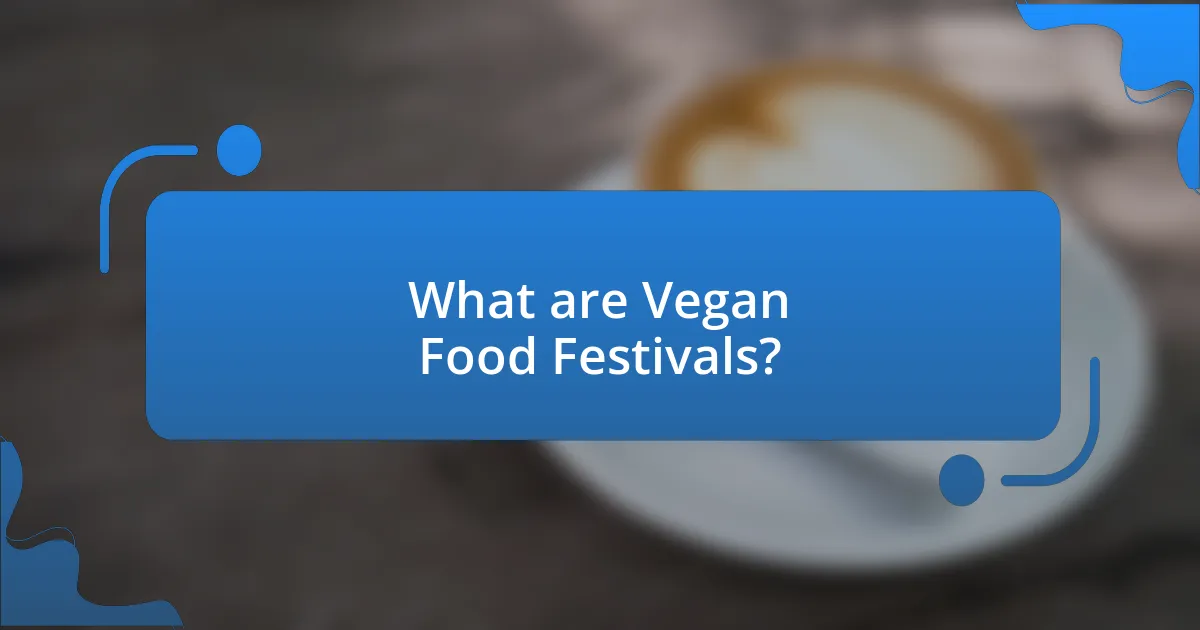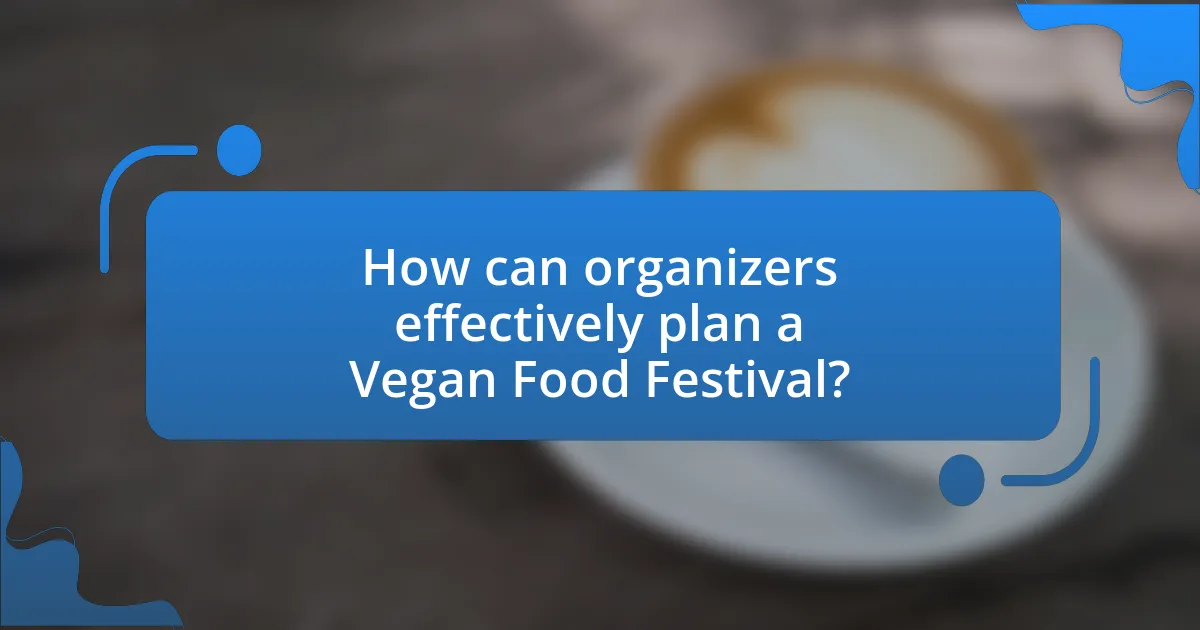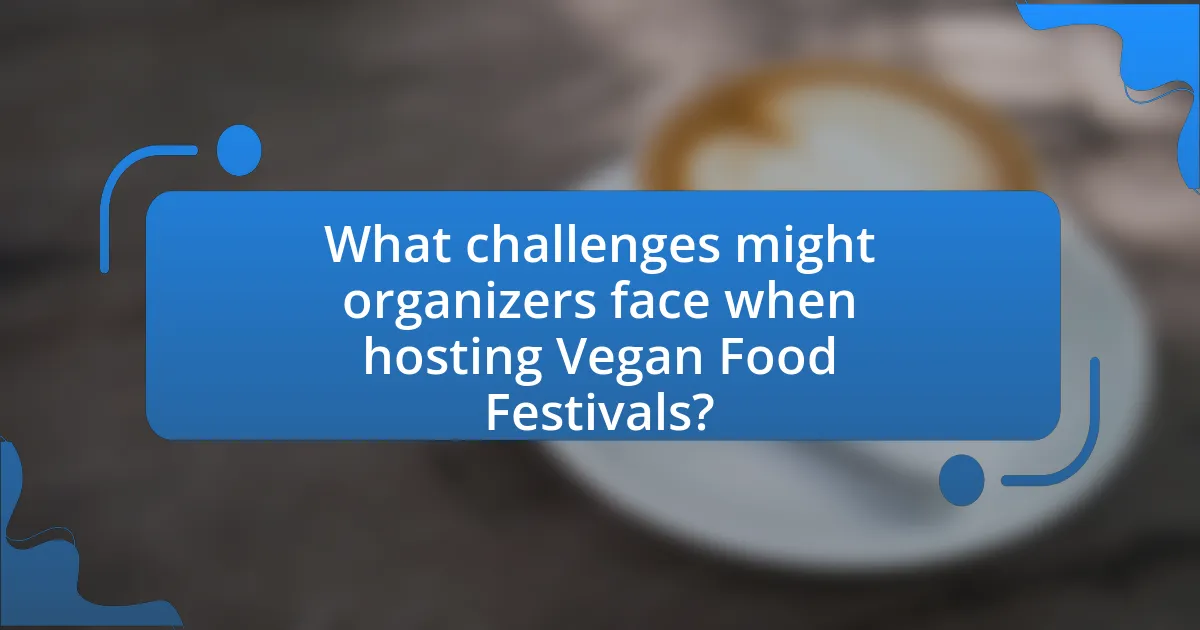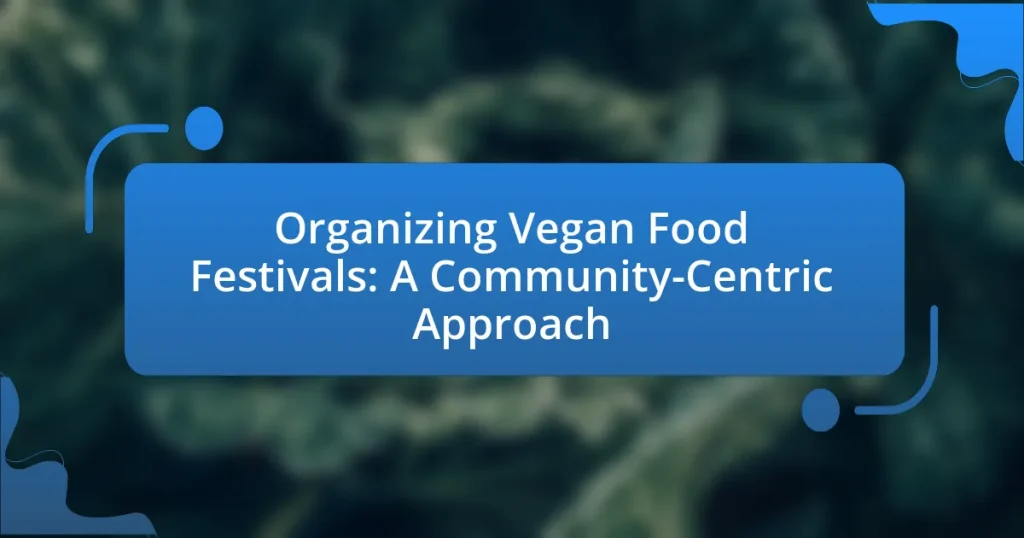Vegan food festivals are events dedicated to celebrating plant-based cuisine, featuring a variety of vegan food options, cooking demonstrations, and educational sessions on veganism and sustainability. These festivals differ from traditional food festivals by exclusively offering plant-based dishes and emphasizing ethical eating practices. The article outlines the importance of community values in organizing these festivals, the benefits of a community-centric approach, and effective planning strategies, including vendor selection and marketing. Additionally, it addresses challenges such as logistical issues and public perception, while highlighting best practices for ensuring sustainability and enhancing the overall festival experience.

What are Vegan Food Festivals?
Vegan food festivals are events that celebrate plant-based cuisine, showcasing a variety of vegan food options, products, and culinary experiences. These festivals typically feature food vendors, cooking demonstrations, workshops, and educational sessions focused on veganism and sustainable living. According to a report by the Plant Based Foods Association, the demand for plant-based foods has significantly increased, with sales growing by 27% in 2020, indicating a rising interest in vegan lifestyles and events.
How do Vegan Food Festivals differ from traditional food festivals?
Vegan food festivals differ from traditional food festivals primarily in their exclusive focus on plant-based cuisine. Traditional food festivals typically feature a wide variety of food options, including meat, dairy, and other animal products, whereas vegan food festivals strictly offer dishes that contain no animal-derived ingredients. This distinction caters to the growing demand for vegan options, with a 2021 survey indicating that 6% of Americans identify as vegan, reflecting a significant cultural shift towards plant-based diets. Additionally, vegan food festivals often emphasize sustainability and ethical eating practices, promoting local and organic ingredients, which contrasts with some traditional festivals that may not prioritize these values.
What types of food are typically featured at Vegan Food Festivals?
Vegan Food Festivals typically feature a diverse array of plant-based foods, including vegan versions of traditional dishes, raw foods, desserts, and international cuisines. These festivals often showcase items such as vegan burgers, plant-based cheeses, dairy-free ice creams, and gluten-free options, reflecting the growing demand for inclusive and innovative food choices. According to a report by the Plant Based Foods Association, the plant-based food market has seen significant growth, indicating a rising interest in vegan options among consumers.
Why is the focus on veganism important for these festivals?
The focus on veganism is important for these festivals because it promotes sustainability and health within the community. Veganism significantly reduces the environmental impact associated with animal agriculture, which contributes to climate change, deforestation, and biodiversity loss. According to a study published in the journal “Nature,” adopting a plant-based diet could reduce greenhouse gas emissions by up to 70% by 2050. Additionally, these festivals provide an opportunity to educate attendees about the health benefits of a vegan diet, such as lower risks of chronic diseases, as supported by research from the American Journal of Clinical Nutrition. By centering on veganism, these festivals foster a culture of compassion and inclusivity, aligning with the values of many community members who prioritize ethical food choices.
What role do community values play in organizing Vegan Food Festivals?
Community values are fundamental in organizing Vegan Food Festivals as they shape the festival’s mission, activities, and participant engagement. These values foster a sense of belonging and shared purpose among attendees, which enhances community participation and support. For instance, festivals often emphasize sustainability, health, and animal welfare, reflecting the collective beliefs of the community. Research indicates that events aligned with community values attract more participants and sponsors, as seen in the success of festivals like the Vegan Street Fair in Los Angeles, which draws thousands annually by promoting local businesses and ethical eating practices.
How can community involvement enhance the festival experience?
Community involvement enhances the festival experience by fostering a sense of ownership and connection among participants. When local residents actively participate in organizing and running the festival, they contribute unique cultural elements, such as traditional recipes and local music, which enrich the overall atmosphere. Studies show that festivals with strong community engagement report higher satisfaction rates among attendees, as evidenced by a 2018 survey conducted by the National Endowment for the Arts, which found that 75% of participants felt more connected to their community during events that featured local involvement. This connection not only boosts attendance but also encourages repeat participation in future festivals, creating a sustainable cycle of community engagement and cultural celebration.
What are the benefits of a community-centric approach to festival organization?
A community-centric approach to festival organization enhances local engagement and fosters a sense of belonging among participants. This approach encourages collaboration between organizers and community members, leading to tailored events that reflect local culture and preferences. Research indicates that festivals designed with community input see increased attendance and satisfaction, as they resonate more with the audience’s values and interests. For instance, a study by the National Endowment for the Arts found that community involvement in event planning significantly boosts local pride and participation, ultimately contributing to the festival’s success and sustainability.

How can organizers effectively plan a Vegan Food Festival?
Organizers can effectively plan a Vegan Food Festival by establishing a clear vision and engaging the community throughout the planning process. This involves identifying the target audience, selecting a suitable venue, and curating a diverse lineup of vegan vendors and activities that cater to various dietary preferences. Engaging local vegan businesses and chefs not only enhances the festival’s offerings but also fosters community support and participation.
Additionally, effective marketing strategies, including social media promotion and partnerships with local organizations, can increase visibility and attendance. According to a study by the Plant-Based Foods Association, the plant-based food market has grown by 27% in the past year, indicating a rising interest in vegan options, which can be leveraged to attract attendees.
Finally, incorporating educational components, such as cooking demonstrations and workshops, can enrich the festival experience and promote veganism as a sustainable lifestyle choice.
What are the key steps in the planning process?
The key steps in the planning process for organizing vegan food festivals include defining objectives, conducting market research, establishing a budget, selecting a venue, coordinating logistics, promoting the event, and evaluating outcomes. Defining objectives sets the direction for the festival, ensuring alignment with community interests. Conducting market research helps identify target audiences and preferences, which is crucial for tailoring the festival experience. Establishing a budget ensures financial feasibility and resource allocation, while selecting a venue involves considering accessibility and capacity to accommodate attendees. Coordinating logistics encompasses vendor arrangements, permits, and scheduling, which are essential for smooth operations. Promoting the event through various channels increases visibility and attendance, and evaluating outcomes post-event provides insights for future improvements. Each step is integral to the successful execution of a community-centric vegan food festival.
How do you select a suitable venue for the festival?
To select a suitable venue for the festival, assess the location’s accessibility, capacity, and amenities. Accessibility ensures that attendees can easily reach the venue via public transport or parking options, which is crucial for maximizing attendance. Capacity must accommodate the expected number of participants, as overcrowding can detract from the experience. Amenities such as restrooms, electricity, and kitchen facilities are essential for operational efficiency and attendee comfort. Research indicates that venues with these characteristics significantly enhance participant satisfaction and engagement, as seen in successful festivals like the Vegan Food Festival in Los Angeles, which attracted over 10,000 attendees due to its well-chosen venue.
What factors should be considered when choosing vendors?
When choosing vendors for vegan food festivals, key factors include the vendor’s product quality, alignment with vegan principles, reliability, and experience in similar events. High-quality products ensure customer satisfaction and repeat attendance, while alignment with vegan principles guarantees that offerings meet the dietary needs of attendees. Reliability is crucial for timely delivery and service during the event, and experience in similar events indicates the vendor’s capability to handle the unique challenges of food festivals. These factors collectively contribute to a successful festival that resonates with the community’s values and expectations.
How can marketing strategies be tailored for Vegan Food Festivals?
Marketing strategies for Vegan Food Festivals can be tailored by focusing on community engagement, targeted messaging, and partnerships with local vegan businesses. Engaging the community through social media campaigns that highlight local vegan chefs and vendors can create excitement and anticipation. Targeted messaging should emphasize the health benefits and environmental impact of veganism, appealing to both existing vegans and those interested in plant-based diets. Collaborating with local vegan businesses for sponsorships or co-hosting events can enhance credibility and attract a larger audience. According to a study by the Plant-Based Foods Association, the plant-based food market grew by 27% in 2020, indicating a rising interest that can be leveraged in marketing efforts.
What channels are most effective for reaching a vegan audience?
Social media platforms, particularly Instagram and Facebook, are the most effective channels for reaching a vegan audience. These platforms allow for visually appealing content that resonates with the values and lifestyle of vegans, such as plant-based recipes and ethical considerations. According to a 2021 survey by the Plant-Based Foods Association, 70% of consumers interested in plant-based diets engage with brands on social media, highlighting its effectiveness in reaching this demographic. Additionally, vegan blogs and online communities serve as influential channels, providing trusted information and fostering engagement among like-minded individuals.
How can social media be leveraged to promote the festival?
Social media can be leveraged to promote the festival by creating targeted campaigns that engage the community and highlight festival activities. Utilizing platforms like Instagram and Facebook allows organizers to share visually appealing content, such as photos of vegan dishes and testimonials from past attendees, which can increase interest and attendance. According to a study by the Pew Research Center, 69% of adults in the U.S. use social media, making it an effective channel for reaching a broad audience. Additionally, using event-specific hashtags can enhance visibility and encourage user-generated content, further amplifying the festival’s reach.

What challenges might organizers face when hosting Vegan Food Festivals?
Organizers of Vegan Food Festivals may face challenges such as limited vendor participation, logistical issues, and public perception. Limited vendor participation can occur due to a lack of awareness or interest in vegan products among local businesses, which can reduce the variety of offerings at the festival. Logistical issues may include securing appropriate venues, managing permits, and ensuring adequate infrastructure for food preparation and waste disposal. Public perception challenges arise from misconceptions about vegan diets, which can deter attendance from non-vegan individuals. These factors can significantly impact the success and reach of the festival, as evidenced by surveys indicating that diverse vendor representation and effective marketing strategies are crucial for attracting a broader audience.
How can logistical issues be addressed?
Logistical issues can be addressed by implementing a detailed planning process that includes clear communication, resource allocation, and contingency strategies. Effective planning involves creating a timeline that outlines all necessary tasks, assigning responsibilities to team members, and ensuring that all stakeholders are informed of their roles. For instance, utilizing project management tools can enhance coordination among volunteers and vendors, reducing the likelihood of miscommunication. Additionally, conducting a risk assessment can identify potential challenges, allowing organizers to develop contingency plans, such as alternative suppliers or backup venues. This structured approach has been shown to improve event execution, as evidenced by successful festivals that reported fewer logistical disruptions when following these practices.
What are common challenges related to food safety and regulations?
Common challenges related to food safety and regulations include compliance with local health codes, ensuring proper food handling practices, and managing allergen information. Organizers of vegan food festivals must navigate varying regulations across jurisdictions, which can complicate event planning. For instance, the U.S. Food and Drug Administration (FDA) mandates specific food safety standards that must be adhered to, such as maintaining proper temperatures for food storage and preparation. Additionally, the lack of standardized regulations for vegan products can lead to confusion regarding labeling and ingredient transparency, making it difficult for consumers to make informed choices.
How can organizers manage crowd control effectively?
Organizers can manage crowd control effectively by implementing a combination of strategic planning, clear communication, and real-time monitoring. Strategic planning involves designing the layout of the event to facilitate smooth movement and prevent bottlenecks, such as creating designated entry and exit points. Clear communication includes providing attendees with information about the event schedule, layout, and safety protocols through signage and announcements. Real-time monitoring can be achieved by deploying trained staff and utilizing technology, such as crowd management software, to track crowd density and flow. Studies have shown that effective crowd management reduces incidents and enhances the overall experience, as evidenced by successful events that have utilized these strategies, leading to a 30% decrease in crowd-related issues.
What strategies can be implemented to ensure festival sustainability?
To ensure festival sustainability, organizers can implement strategies such as waste reduction, local sourcing, and community engagement. Waste reduction can be achieved by providing recycling and composting stations, which studies show can divert up to 70% of waste from landfills. Local sourcing of food and materials not only supports local economies but also reduces carbon footprints associated with transportation; for instance, sourcing ingredients from local farms can cut transportation emissions by up to 50%. Community engagement fosters a sense of ownership and responsibility among attendees, leading to increased participation in sustainable practices, as evidenced by festivals that report higher volunteer involvement when local communities are actively engaged in planning and execution.
How can waste management be improved at Vegan Food Festivals?
Waste management at Vegan Food Festivals can be improved by implementing comprehensive recycling and composting programs. These programs can significantly reduce landfill waste by ensuring that organic materials, such as food scraps and biodegradable packaging, are properly processed. For instance, a study by the Environmental Protection Agency indicates that composting can divert up to 30% of waste from landfills, which is particularly relevant for events with high food waste like festivals. Additionally, providing clearly labeled bins for recycling, compost, and landfill waste encourages attendees to dispose of their waste correctly, further enhancing waste management efforts.
What practices can reduce the environmental impact of the festival?
Implementing waste reduction strategies, such as providing recycling and composting stations, can significantly reduce the environmental impact of a festival. These practices encourage attendees to dispose of waste responsibly, minimizing landfill contributions. For instance, a study by the Environmental Protection Agency indicates that recycling and composting prevented the release of approximately 186 million metric tons of carbon dioxide equivalent into the air in 2018. Additionally, sourcing local and organic food reduces transportation emissions and supports sustainable agriculture, further lowering the festival’s carbon footprint.
What are some best practices for organizing a successful Vegan Food Festival?
To organize a successful Vegan Food Festival, it is essential to focus on community engagement, diverse vendor selection, and effective marketing strategies. Engaging the local community fosters a sense of ownership and participation, which can increase attendance and support. A diverse selection of vendors ensures a wide range of food options, appealing to various tastes and dietary preferences, which can enhance the festival’s reputation and draw larger crowds. Effective marketing strategies, including social media promotion and partnerships with local businesses, can significantly boost visibility and attract attendees. According to a study by the Plant-Based Foods Association, events that actively involve the community and offer diverse options see a 30% increase in attendance compared to those that do not.
How can feedback from attendees be utilized for future events?
Feedback from attendees can be utilized for future events by systematically analyzing their responses to improve event planning and execution. This analysis allows organizers to identify strengths and weaknesses in various aspects, such as venue selection, food offerings, and overall attendee experience. For instance, if attendees express dissatisfaction with the variety of food options, future events can incorporate a broader range of vegan dishes to cater to diverse preferences. Additionally, positive feedback can highlight successful elements that should be retained or expanded upon in subsequent festivals. By leveraging specific data from surveys or feedback forms, organizers can make informed decisions that enhance attendee satisfaction and engagement, ultimately leading to increased attendance and community support for future vegan food festivals.
What are the key elements that contribute to a memorable festival experience?
The key elements that contribute to a memorable festival experience include engaging activities, diverse food options, strong community involvement, and effective organization. Engaging activities, such as live music, workshops, and interactive booths, create an immersive atmosphere that captivates attendees. Diverse food options, particularly in a vegan food festival, cater to various tastes and dietary preferences, enhancing the overall enjoyment. Strong community involvement fosters a sense of belonging and connection among participants, making the event feel inclusive and welcoming. Effective organization, including clear signage, well-planned schedules, and adequate facilities, ensures a smooth experience for attendees. These elements collectively enhance the festival’s appeal and leave a lasting impression on participants.


